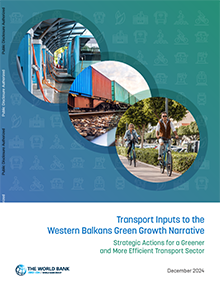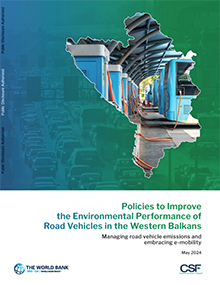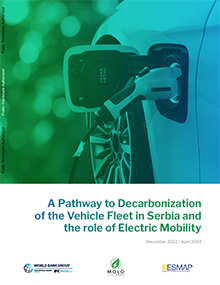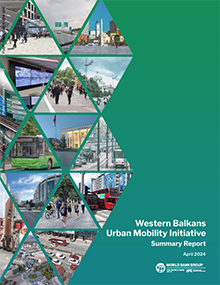The Western Balkan region is experiencing sustained economic growth; however, it is also facing challenges in regional integration affecting logistics costs, transport infrastructure being more frequently disrupted by climate-related shocks, and growing congestion and pollution in urban centers. Moreover, transport accounts for 15 percent of the Western Balkan region's greenhouse gas emissions and is the fastest-growing emitting sector. Transport systems in the Western Balkan countries are at a critical decision point for determining development trajectories and climate impacts.
As detailed in the report Transport Inputs to the Western Balkans Green Growth Narrative: Strategic Actions for a Greener and More Efficient Transport Sector, three strategic policy actions are essential to reducing emissions, attracting investments, facilitating regional trade and integration, and improving health outcomes for communities.
- Managing Road Vehicle Emissions: This involves reducing energy consumption and emissions in the road vehicle sector, which is a primary contributor to urban pollution and accounts for 70 percent of total oil consumption and for 95 percent of transport-related greenhouse gas emissions in the Western Balkans. Achieving this goal requires both cleaner internal combustion engine vehicles and a gradual shift toward electric mobility, supported by regulatory measures, incentive programs, and tax reforms. Detailed recommendations for priority policy actions in this area are presented in the report titled Policies to Improve the Environmental Performance of Road Vehicles in the Western Balkans. Each country in the Western Balkans will need a tailored transport decarbonization and electrification strategy that considers specific dynamics, equity, economic implications, and the political landscape, as illustrated in the report A Pathway to Decarbonization of the Vehicle Fleet in Serbia and the Role of Electric Mobility.
- Efficient Regional Integration: This strategic action aims to improve connectivity within the Western Balkans and between neighboring countries, facilitating trade and increasing the resilience of transport infrastructure in a region vulnerable to climate-related shocks. This policy area underscores the importance of investing in low-carbon modes of transport such as rail and inland waterways, but also on engaging in a range of institutional reforms and capacity building to pursue a transport system that is not only environmentally and socially sustainable but also financially.
- People-Centered Urban Mobility: This focuses on shifting urban mobility toward cleaner and more inclusive modes while addressing significant challenges in urban areas, such as air pollution and congestion. The report Western Balkans Urban Mobility Initiative analyzes several cities in the region, including Sarajevo, Banja Luka, Belgrade, Novi Sad, Niš, Pristina, Skopje, Tirana, Durres, and Podgorica, and offers recommendations for interventions and investment opportunities in urban mobility, and highlights the critical role of unleashing the synergies between the public and the private sector to facilitate the deployment of sustainable transport solutions.




